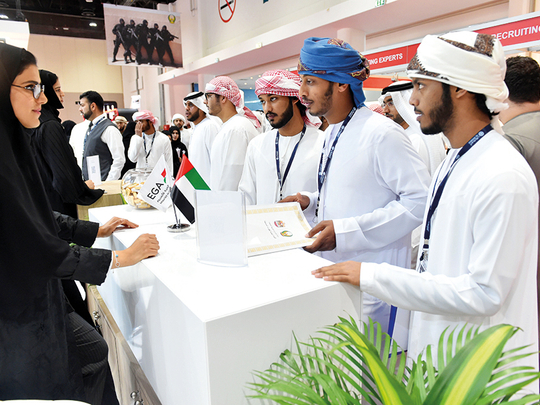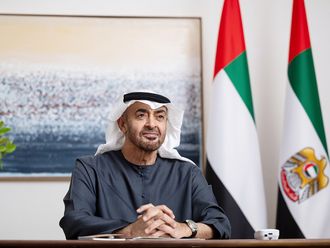
Abu Dhabi: The minister in charge of human resources development on Wednesday announced a slew of initiatives and policies aimed at accelerating Emiratisation, empowering citizens and raising their competitiveness until 2021.
Nasser Bin Thani Al Hameli, Minister of Human Resources and Emiratisation, said these initiatives will contribute to the creation of 15,000 jobs suitable for citizens in 2018 in strategic economic sectors, in addition to enabling the participation of national human resources in the labour market and raising their competitiveness.
Al Hameli told a press conference in Abu Dhabi on Wednesday that the ministry has adopted an ambitious plan for Emiratisation in the private sector.
- Nasser Bin Thani Al Hameli
“The ministry has been able to employ 6,862 citizens in the private sector in 2017, an increase of 22 per cent over 2016, during which 5,608 citizens were employed,” Al Hameli said.
However, he said, “this did not come up to our ambition and aspirations” as the directives of His Highness Shaikh Mohammad Bin Rashid Al Maktoum, Vice-President and Prime Minister of the UAE and Ruler of Dubai, stressed the need to accelerate the pace of Emiratisation, which is moving slowly.
The Emiratisation plan comes as part of a pilot project that was launched in December 2016, aimed at employing UAE nationals in the private sector across the UAE.
“Emiratisation and education are a key priority in the work of the government and a national responsibility of all, which requires the integration of all national initiatives to achieve the aspirations of the people of the UAE,” Al Hameli said.
“Based on this, the ministry has developed a new methodology based on three basic principles. The first is to consider Emiratisation as a joint responsibility that requires the development of partnerships with the federal and local governmental sector and the free zones.
“The second is developing a strategic framework for workforce planning by focusing on qualitative Emiratisation in targeted sectors.
“And the third is to continue to encourage businesses to adopt Emiratisation and encourage citizens to enter and continue to work in the targeted sectors and jobs.”
Al Hameli said the ministry has launched several initiatives and programmes to be implemented in three phases until 2021. The first phase, which will be implemented this year, targets acceleration and enhancement of direct employment and training of citizens.
This phase includes four major initiatives, the first of which is the qualitative Emiratisation initiative, where more than 2,000 establishments operating in vital strategic sectors will be targeted, with 400 jobs identified as priorities for employment by citizens. In total, these sectors will provide more than 15,000 jobs suitable for citizens by the end of this year.
Several criteria are being considered for determining the targeted sectors — the percentage of contribution to GDP, the annual growth rate in the sector and its importance in the federal and local government’s strategic plans. The average wage in the targeted profession must not be less than Dh10,000 and that the profession must be at the levels of first, second and third skills and it must suit the specialities of current and future citizens.
Al Hameli also spoke of a national programme to raise awareness of citizens, job seekers, students, schools, higher education institutions and parents about the value of work and the advantages offered by the private sector.
Another initiative was the Emiratisation Partners Club which was launched by the ministry last year to encourage the facilities to attract and train Emiratis by providing the member organisations with incentives, thus contributing to quality Emiratisation.
Al Hameli said the ministry will hire satellite offices for Emiratisation partners who will create job opportunities for citizens in remote areas in the Northern Emirates.
He said the first satellite office in Khorfakkan was launched under an agreement between the ministry and Emirates NBD to employ 10 citizens in the first stage.
At the end of 2018, 500 such offices will be opened at the request of companies, starting with Ras Al Khaimah, Fujairah and Khorfakkan. Similar offices have been opened in Musaffah, Bada Zayed, Al Ain and Al Zaid in Abu Dhabi emirate, and Ajman and Umm Al Quwain.
Al Hameli said the second phase of the Emiratisation agenda is to “enable the participation of national human resources and it will be implemented during 2018 and 2019. It aims at empowering citizens in the targeted professions and priority sectors and align this objective with the outputs of education”.
The third phase of the agenda aims to increase the competitiveness of national human resources and will be applied during 2019 and 2021 as the main engine for the transition to a competitive knowledge economy.
Al Hameli said the ministry’s database includes 4,155 Emirati job seekers, of whom 2,950 are women and rest men. Of them, 41 per cent have high school diplomas, 5 per cent have qualification below secondary school, 45 per cent have bachelor degrees and higher diplomas, six per cent diploma degrees and three per cent doctorate and master’s degrees.
UAE’s Emiratisation targets by 2021
50% of Emirati workforce must be employed in private sector
Emiratis must account for 5% of private sector workforce and 6% of total UAE workforce
Highlights
■ 15,000 jobs to be made available for citizens by the end of 2018
■ 6,862 citizens employed in 2017 — 22% increase from 5,608 Emiratis in 2016
■ Incentive package envisaged for members of Emiratisation Partners Club
■ Setting up Emiratisation portal and a national observatory of labour force
■ 4,155 Emirati job seekers registered in the ministry’s database (2,950 or 63% women and 1,205 or 37% men)
■ 45% of registered candidates hold university degrees, 41% high school certificates, 3% PhD and master’s degrees, while 5% have no high school certificates












